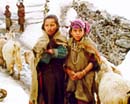|
April 4, 1998
QUOTE MARTIAL
MAKING WAVES
SHORT TAKES
ROUGH CUTS
MEMORIES
ARCHIVES
MOVIES CHAT
|

Mysterious Malana
V S Srinivasan

|
The Malana village. Click for bigger pic!
|
Democracy may be a Greek word, but the concept is Indian," says Vivek Mohan, summing up the theme of his 73-minute documentary, In Search Of Malana.
Malana is a tiny hamlet in the Kulu valley of Himachal Pradesh. Its inhabitants keep to themselves, and, if they need advice, seek it from Jamlu Dev, the local deity.
Their system of governance, called Ra-Deo (ruling in the name of God), may sound a trifle odd but, considering its contained nature, it is perhaps a more stable form of government than the Indian Union can provide.
While a 'divinely appointed' ruler is the common feature in a monarchy, the oldest known form of government known to man, Malana works through a upper house and a lower house. The latter consists of the heads of all the families in Malana, and any issue affecting Malana's citizens are discussed by the Kameti, the upper house, till a unanimous decision, not just a majority, is achieved.
If the arguments get too protracted, the matter goes to Jamlu Dev. Two sheep, representing the plaintiff and the defendant, have an equal amount of poison injected into them. The god is expected to have voted in favour of one whose sheep lives.

|
A thanka painting of Malana god Jhamlu Dev. Click for bigger pic!
|
The two governing houses also have eight elected members from Malana's eight clans and three permanent members -- the divinely appointed gur (the mouthpiece of Lord Jamlu), the administrative head, the kardar (also called the karmisht), and the pujari, the religious head.
"The basic thrust was to show the functioning of their government and culture. The film gives a hint of the living fossil of their republic," says Vivek. So In Search... "is not only about the Malana government, but a peep into the life and customs of a tribe mostly untouched by civilisation."
Access to Malana is difficult; the only way to reach the hamlet is after trekking through three treacherous passes 13,000 feet high. The people of Malana don't interact much with the outside world, except rarely, for supplies. They do use electricity, but their needs are very simple.
Their origin is lost in antiquity. Some Westerners have speculated whether they are descendants of Alexander's Greeks though the Macedonian general and his troops never crossed the Beas river. Vivek has tried to answer some of the questions after a great deal of research. He read everything available on the subject in various libraries.
And he spent four years shooting the film in Malana. It wasn't easy.
"Initially, I took along a guide and interpreter. He belonged to the neighbouring hamlet which owed allegiance to this one and he had a few relatives here. Because of this it was easy for me to get into their community. Earlier, only official delegations used to come here...

|
The Phagli winter festival in Malana. Click for bigger pic!
|
"It took a great deal of persuasion for the Malana people to open up and talk about themselves into the camera," says Vivek. And it was finally the deity that ruled in his favour. But there was still the harsh cold and snow to contend with, and having to lugging equipment, personal effects and supplies on foot 13,000 feet.
He discovered there was no idol in Malana. "It was just two long swords that they bore in the procession," he says. Vivek found the idol installed in a village near Spithi, close to Lahaul. "The Malanis did not know that the idol existed.
"They were very scared even to show their wealth and didn't give me permission to shoot that. In fact, I had to pay them a sum every time I went there," he says. And the money went straight into the temple treasury. But determination and co-operative producers who let him continue work for four years instead of the two years initially planned, saw the documentary through. It was difficult shooting in a cold and inaccessible place, but "fortunately, nothing went wrong," he says.
Vivek, who is from Shimla, initially came to do "something worthwhile" in Bombay. Seeking a job as a copywriter he finally landed a job in Lintas's film department. "That's where I received the basic grounding of what communication means," he says. After three years with Lintas, he did a brief stint with director Pankuj Parasher but "couldn't gel with the atmosphere of the film industry".
He stumbled upon the subject when he visited a friend's home in the Kulu valley. A casual mention of Malana remained with him. And when Manmohan Shetty and Pradeep Uppoor (who have also made Chakra, Ardh Satya, Aaghat and serials like Aahat and Srikant), suggested he make a documentary for them, he thought of mysterious Malana.
"I also had the psychological advantage of being from the same state," says Vivek, who plans to get back to his "bread and butter", ad and corporate films.
Future plans we ask. He laughs. "I am still recovering from this one."
|